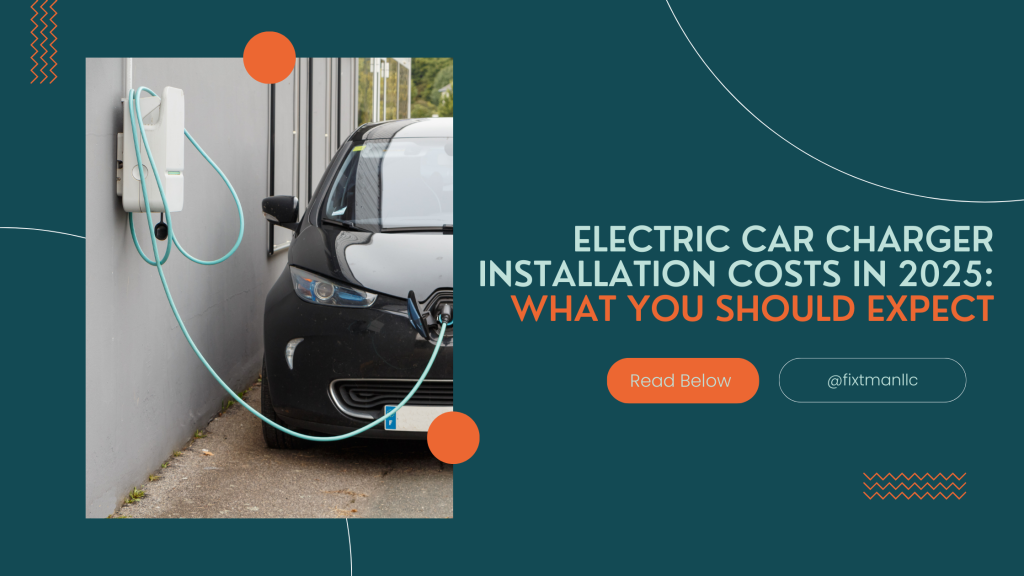As electric vehicles (EVs) continue to grow in popularity, many homeowners are considering installing a home electric vehicle charging station. The convenience of charging at home, alongwith the environmental benefits of EVs, makes the investment worthwhile for many. However, understanding the costs associated with electric car charger installation in 2025 is crucial to making an informed decision. In this article, we’ll dive into the types of chargers, factors that influence installation prices, and ways to reduce costs.
Types of Electric Car Chargers and Their Costs
When it comes to electric car charger installation, the type of charger you choose will significantly impact the overall cost. There are three main types of chargers to consider: Level 1, Level 2, and Level 3. Let’s take a closer look at each.
Level 1 Chargers
Level 1 chargers are the most basic type and typically use a standard 120-volt outlet. They can be plugged directly into any regular home outlet, making them the least expensive option for installation. However, their charging speed is quite slow, often taking over 24 hours to fully charge an EV battery.
Estimated Cost: Installing a Level 1 charger is usually free if you already have a suitable 120-volt outlet in place. If any electrical work is required, such as adding a new outlet or upgrading your system, the cost could range from 200 to 500 dollars.
Level 2 Chargers
Level 2 chargers are the most common type for residential installations. They operate on a 240-volt circuit and can charge an EV much faster than a Level 1 charger,typically in 4 to 8 hours, depending on the car’s battery capacity. Many homeowners prefer installing an electric car charging point at home to take advantage of the speed and efficiency of Level 2 chargers.
Estimated Cost: The installation of a Level 2 charger typically costs between 500 and 2,000 dollars. This includes the charger itself, along with labor and potential electrical upgrades. Electric car charger home installation will be at the higher end of the price spectrum if you need to upgrade your electrical panel.
Level 3 Chargers (DC Fast Chargers)
Level 3 chargers, also known as DC Fast Chargers, are designed for commercial or high-demand residential settings. These chargers are much faster than Level 2 chargers, with the ability to charge an EV in under 30 minutes. However, they are not typically recommended for home installations due to their high power requirements and the complexity of installation.
Estimated Cost: Installing a Level 3 charger can cost anywhere from 10,000 to 40,000 dollars, including necessary electrical upgrades. These chargers require specialized infrastructure, so they are usually installed at public electric car charging stations.
Factors Affecting Installation Costs in 2025
Several factors can influence the cost of electric vehicle charging station installation in 2025. Let’s explore the most significant ones.
Electrical System Upgrades
If your home’s electrical system isn’t equipped to handle the power demands of an EV charger, you may need to upgrade your electrical panel. This is particularly common for older homes. Electrical upgrades can range from 500 to 2,500 dollars, depending on the complexity of the work required.
Permits and Inspections
Some regions require permits and inspections before you can install an EV charger. These fees vary based on location, but typically range from $50 to $500. It’s essential to work with a licensed EV charger installation service to ensure compliance with local regulations.
Labor Costs
Labor costs for EV charger installation services depend on the complexity of the installation. On average, you can expect to pay 50 to 150 dollars per hour for a licensed electrician. For more complex installations, such as running new circuits or upgrading your electrical system, labor costs could increase significantly.
Location and Installation Complexity
The location of your charging station can also affect the overall cost. For instance, if your electric car charger is far from your electrical panel, you may incur additional costs for running wiring. The more complicated the installation, the higher the labor costs will be.
Smart Charger Features
Many modern EV chargers come with smart features, such as app connectivity, energy tracking, and scheduling. These chargers are often more expensive to install than basic models, with prices ranging from $700 to $2,000, depending on the brand and features.
Cost Breakdown for Homeowners
Let’s break down the estimated costs for both basic and complex installations so you can get a better idea of what to expect.
Estimated Costs for Basic Installations
For a basic electric car charger home installation with a Level 2 charger, you can expect to pay anywhere from $500 to $1,500. This price assumes your electrical system is already sufficient for the installation and that no major upgrades are necessary.
Estimated Costs for Complex Installations
For more complex electric charger installation that involves electrical panel upgrades, permits, and additional wiring, the cost can range from $2,000 to $5,000 or more. These installations often require more time and materials, which is reflected in the higher cost.
Ways to Reduce Installation Costs
There are several ways to reduce the overall cost of installing an EV charger at home. Here are some helpful tips.
Take Advantage of Government Incentives
Many states and municipalities offer rebates or tax incentives for installing an electric car charging point. These incentives can significantly reduce the cost of installation, so it’s worth researching any available programs in your area.
Bundling Charger Installation with Home Renovations
If you’re already planning home renovations, consider bundling your electric vehicle charging station installation with other electrical work. This can help reduce labor costs and potentially save you money.
DIY Options
If you’re comfortable with electrical work, some homeowners choose to tackle the installation themselves. While this can save you money, it’s essential to ensure that all installations meet local safety codes. For most people, hiring a professional is the safest and most efficient option.
Benefits of Installing an EV Charger at Home
There are numerous benefits to installing an EV charging station at home. For one, you’ll have the convenience of charging your vehicle overnight, ensuring it’s always ready for the road. Additionally, home charging is often more cost-effective than relying on public charging stations. Over time, this convenience and savings can add up significantly.
Having a home electric vehicle charging station installation also adds value to your property. As electric vehicles become more mainstream, homes with charging capabilities will be in high demand.
In conclusion, the cost of installing an electric car charging station in 2025 can vary widely depending on several factors. While the upfront cost may seem high, the long-term benefits, including convenience, cost savings, and environmental impact, make it a worthwhile investment for many homeowners. Whether you’re looking to install an EV charger at home or upgrade to a more powerful system, understanding the costs and available incentives can help you make an informed decision.



